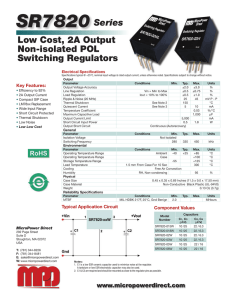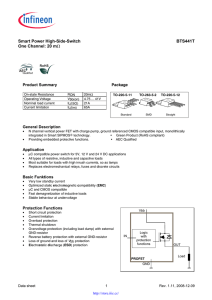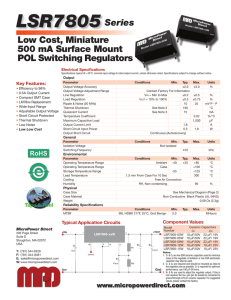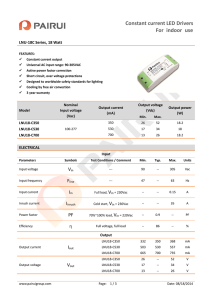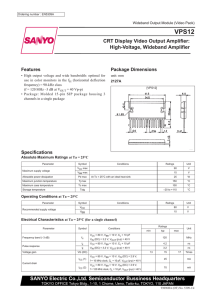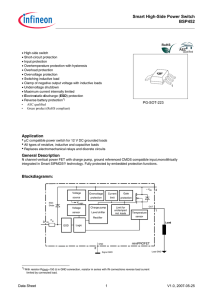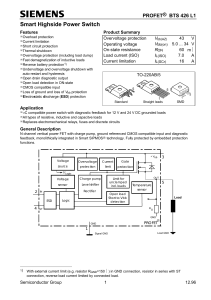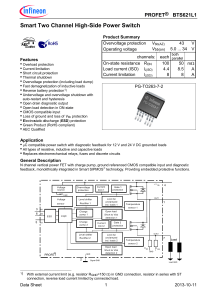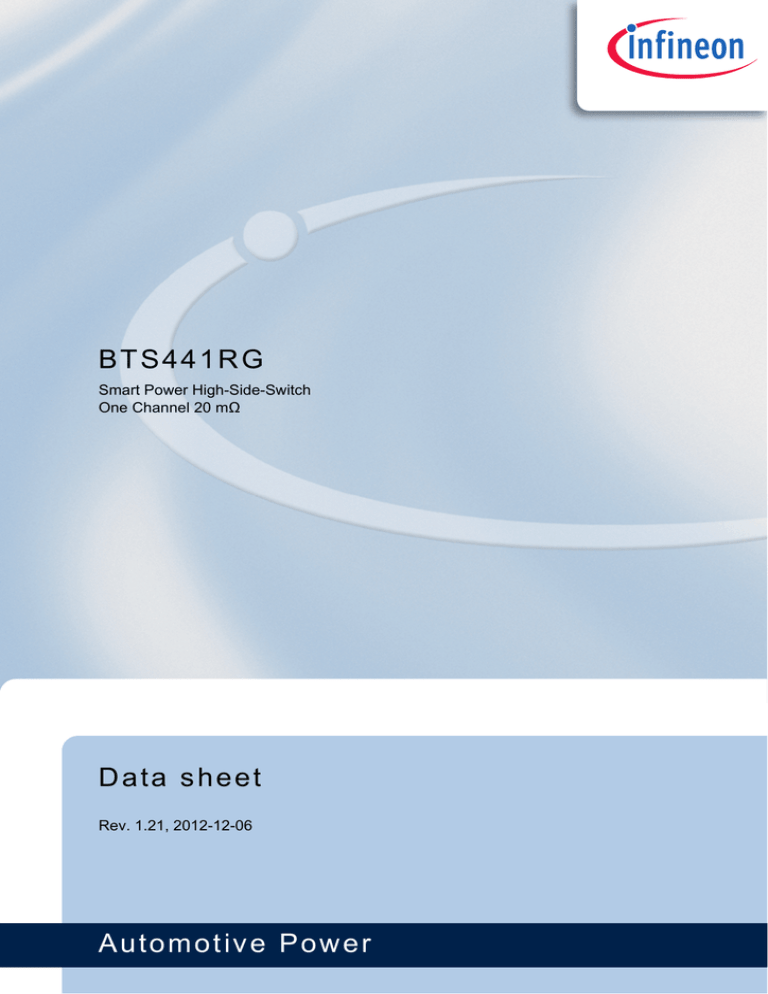
BTS441RG
Smart Power High-Side-Switch
One Channel 20 mΩ
Data sheet
Rev. 1.21, 2012-12-06
Automotive Power
Smart Power High-Side-Switch
One Channel: 20 mΩ
1
BTS441RG
Overview
General Description
•
•
•
•
N channel vertical power FET with charge pump, ground referenced
CMOS compatible input, monolithically integrated in Smart SIPMOS
technology
Providing embedded protective functions
Green Product (RoHS compliant)
AEC Qualified
Application
•
•
•
•
PG-TO263-5
µC compatible power switch 5 V, 12 V and 24 V DC applications
All types of resistive, inductive and capatitive loads
Most suitable for loads with high inrush currents, so as lamps
Replaces electromechanical relays, fuses and discrete circuits
Basic Functions
•
•
•
•
•
Very low standby current
Optimized static electromagnetic compatibility (EMC)
µC and CMOS compatible
Fast demagnetization of inductive loads
Stable behavior at undervoltage
Protection Functions
•
•
•
•
•
•
•
•
Short circuit protection
Current limitation
Overload protection
Thermal Shutdown
Overvoltage protection (including load dump) with
external GND resistor
Reverse battery protection with external GND-resistor
Loss of ground and loss of Vbb protection
Electrostatic discharge (ESD) protection
BTS441RG
3
VBB
Control
Circuit
4
ST
RIN
Temperature
Sensor
5
OUT
2
IN
Type
Package
Marking
BTS441RG
PG-TO263-5
BTS441R
Data sheet
2
GND
Rev. 1.21, 2012-12-06
BTS441RG
Overview
Diagnostic Function
•
•
•
Diagnostic feedback with open drain output
Open load detection in OFF-state
Feedback of thermal shutdown in ON-state
Product Summary
Maximum on-state resistance at Tj = 150 °C
Operating voltage
Nominal load current
Current limitation
RDS(ON)
VSOP
IL (nom)
IL(lim)
20 mΩ
4.75 V … 41 V
21 A
65 A
Product Information
Device Name
Status
Package
Pins
ECO status
BTS441RG
Active
PG-TO263-5
5
Green
BTS441RG
Discontinued
P-TO263-5
5
Gray
BTS441RS
Discontinued
P-TO220-5
5
Gray
BTS441RS
Discontinued
PG-TO220-5
5
Green
Data sheet
3
Rev. 1.21, 2012-12-06
BTS441RG
!'
*
!)
!)
++
)
!
#$
)
!
( ,#-
#
PROFET
%&
!""
#$%&'()
!
*++,
"
#$
Data sheet
4
Rev. 1.21, 2012-12-06
BTS441RG
Maximum Ratings at Tj = 25 °C unless otherwise specified
Parameter
Supply voltage (overvoltage protection see page 4)
Supply voltage for full short circuit protection
Tj Start=-40 ...+150°C
Load dump protection1) VLoadDump = VA + Vs, VA = 13.5 V
RI2)= 2 Ω, RL= 0,5 Ω, td= 200 ms, IN= low or high
Load current (Short-circuit current, see page 5)
Operating temperature range
Storage temperature range
Power dissipation (DC) ; TC≤25°C
Maximal switchable inductance, single pulse
Vbb = 12V, Tj,start = 150°C, TC = 150°C const.
(see diagram, p.7) IL(ISO) = 21 A, RL= 0 Ω: E4)AS=0.7J:
Electrostatic discharge capability (ESD)
IN:
(Human Body Model)
ST:
Out to all other pins shorted:
Symbol
Vbb
Vbb
43
34
Unit
V
V
60
V
IL
Tj
Tstg
self-limited
-40 ...+150
-55 ...+150
A
°C
Ptot
125
W
ZL
VESD
2.1
1.0
4.0
8.0
mH
kV
-10 ... +16
±2.0
±5.0
V
mA
≤1
≤ 75
K/W
VLoad dump3)
Values
acc. MIL-STD883D, method 3015.7 and
ESD assn. std. S5.1-1993; R=1.5kΩ; C=100pF
VIN
IIN
IST
Input voltage (DC)
Current through input pin (DC)
Current through status pin (DC)
see internal circuit diagrams page 7
Thermal resistance
1)
2)
3)
4)
5)
chip - case:
junction - ambient (free air):
SMD version, device on pcb5):
RthJC
RthJA
≤ 33
Supply voltages higher than Vbb(AZ) require an external current limit for the GND pin, e.g. with a 150 Ω
resistor in the GND connection. A resistor for the protection of the input is integrated.
RI = internal resistance of the load dump test pulse generator
VLoad dump is setup without the DUT connected to the generator per ISO 7637-1 and DIN 40839
EAS is the maximum inductive switch off energy
Device on 50mm*50mm*1.5mm epoxy PCB FR4 with 6cm2 (one layer, 70μm thick) copper area for Vbb
connection. PCB is vertical without blown air.
Data sheet
5
Rev. 1.21, 2012-12-06
BTS441RG
Electrical Characteristics
Parameter and Conditions
Symbol
at Tj =-40...+150°C, Vbb = 12 V unless otherwise specified
Values
min
typ
max
Unit
Load Switching Capabilities and Characteristics
On-state resistance (Vbb (pin3) to OUT (pin5));
IL = 2 A Vbb≥7V:
Tj=25 °C: RON
Tj=150 °C:
--
15
28
20
37
mΩ
17
21
--
A
--
--
2
mA
40
40
90
110
200
250
μs
dV /dton
0.1
--
1
V/μs
-dV/dtoff
0.1
--
1
V/μs
4.75
4.75
4.75
5.0
41
43
-----
-----47
5
--1.5
41
43
43
43
-52
10
10
25
10
V
μA
--
2
4
mA
see diagram page 9
Nominal load current (pin 3 to 5)
‘ISO 10483-1, 6.7:VON=0.5V, TC=85°C
IL(ISO)
Output current (pin 5) while GND disconnected or
GND pulled up6), Vbb=30 V, VIN= 0,
IL(GNDhigh)
see diagram page 7
Turn-on time
IN
Turn-off time
IN
RL = 12 Ω,
Slew rate on
10 to 30% VOUT, RL = 12 Ω,
Slew rate off
70 to 40% VOUT, RL = 12 Ω,
to 90% VOUT: ton
to 10% VOUT: toff
Operating Parameters
Operating voltage
Tj =-40°C Vbb(on)
Tj =+25°C
Tj =+105°C6)
Tj =+150°C
Overvoltage protection7)
Tj =-40°C: Vbb(AZ)
I bb = 40 mA
Tj =+25...+150°C:
Standby current (pin 3) 8)
Tj=-40...+25°C: Ibb(off)
Tj=+105°C6):
Tj=+150°C:
VIN=0 see diagram page 9
IL(off)
Off-State output current (included in Ibb(off))
VIN=0
Operating current (Pin 1)9), VIN=5 V,
IGND
6)
7)
8)
9)
V
μA
not subject to production test, specified by design
see also VON(CL) in table of protection functions and circuit diagram page 7
Measured with load, typ. 40 µA when no load in off
Add IST, if IST > 0, add IIN, if VIN>5.5 V
Data sheet
6
Rev. 1.21, 2012-12-06
BTS441RG
Parameter and Conditions
Symbol
at Tj =-40...+150°C, Vbb = 12 V unless otherwise specified
Protection Functions10)
Current limit (pin 3 to 5)
(see timing diagrams, page 9)
Repetitive short circuit current limit
Tj = Tjt (see timing diagrams, page 10)
Thermal shutdown time11)12)
Values
min
typ
max
Unit
Tj =-40°C: IL(lim)
Tj =25°C:
Tj =+150°C:
IL(SCr)
--40
--
-65
-55
85
----
A
Tj,start =25°C: Toff(SC)
--
14
--
ms
41
43
150
---
-47
-10
--
-52
--32
V
°C
K
V
--
540
--
mV
A
(see timing diagram on page 10)
;Tj =-40°C:
Tj=25..150°C: VON(CL)
Thermal overload trip temperature
Tjt
Thermal hysteresis
ΔTjt
13)
Reverse battery (pin 3 to 1)
-Vbb
-VON(rev)
Reverse battery voltage drop (VOUT > Vbb)
IL = -2A
Tj =+150°C:
Output clamp (inductive load switch off)
at VOUT = Vbb - VON(CL), IL= 40 mA
10)
Integrated protection functions are designed to prevent IC destruction under fault conditions described in the
data sheet. Fault conditions are considered as "outside" normal operating range. Protection functions are not
designed for continuous repetitive operation.
11) not subject to production test, specified by design
12) Device on 50mm*50mm*1.5mm epoxy PCB FR4 with 6cm2 (one layer, 70μm thick) copper area for V
bb
connection. PCB is vertical without blown air.
13) Requires 150 Ω resistor in GND connection. The reverse load current through the intrinsic drain-source
diode has to be limited by the connected load. Note that the power dissipation is higher compared to normal
operating conditions due to the voltage drop across the intrinsic drain-source diode. The temperature
protection is not active during reverse current operation! Input and Status currents have to be limited (see
max. ratings page 1 and circuit page 7).
Data sheet
7
Rev. 1.21, 2012-12-06
BTS441RG
Parameter and Conditions
Symbol
Values
min
typ
max
at Tj =-40...+150°C, Vbb = 12 V unless otherwise specified
Diagnostic Characteristics
Open load detection voltage14)
V OUT(OL)
2
3
4
V
RI
VIN(T+)
VIN(T-)
Δ VIN(T)
IIN(off)
IIN(on)
tST delay
2.5
1.2
0.8
-1
4.5
--
3.8
--0.3
-12
--
6.5
2.2
--15
24
500
kΩ
V
V
V
μA
μA
μs
VST(high)
VST(low)
5.4
--
6.1
--
-0.4
V
1
Input and Status Feedback15)
see circuit page 7
Input resistance
Input turn-on threshold voltage
Input turn-off threshold voltage
Input threshold hysteresis
Off state input current (pin 2)
VIN = 0.4 V:
On state input current (pin 2)
VIN = 5 V:
Delay time for status with open load after switch
off
(see timing diagrams, page 11),
Status output (open drain)
Zener limit voltage
IST = +1.6 mA:
ST low voltage
IST = +1.6 mA::
Unit
Truth Table
Normal operation
Open load
Short circuit to Vbb
Overtemperature
L = "Low" Level
H = "High" Level
IN
OUT
ST
L
H
L
H
L
H
Z
H
H
H
L
H
L
H
H
H
L
L
L16)
H
L
H
H
L
Z = high impedance, potential depends on external circuit
Status signal valid after the time delay shown in the timing diagrams
14)
External pull up resistor required for open load detection in off state
If a ground resistor RGND is used, add the voltage drop across this resistor.
16) L, if potential at the Output exceeds the OpenLoad detection voltage
15)
Data sheet
8
Rev. 1.21, 2012-12-06
BTS441RG
Overvolt. and reverse batt. protection
Terms
*"
-.
. ,
)
#$
,
.
.
#
"
. #$
0
*
1.#2(
0
#$
. .
,
VZ1 = 6.1 V typ., VZ2 = 47 V typ., RGND = 150 Ω,
RST= 15 kΩ, RI= 3.5 kΩ typ.
In case of reverse battery the load current has to be
limited by the load. Temperature protection is not
active
Input circuit (ESD protection)
. ,
Open-load detection
( /0 OFF-state diagnostic condition:
Open Load, if VOUT > 3 V typ.; IN low
The use of ESD zener diodes as voltage clamp at DC
conditions is not recommended.
.
(3
Status output
#22
*"
.
%#&
,
!
( /
0
ESD-Zener diode: 6.1 V typ., max 5.0 mA; RST(ON) < 375 Ω
at 1.6 mA, ESD zener diodes are not to be used as voltage
clamp at DC conditions. Operation in this mode may result in
a drift of the zener voltage (increase of up to 1 V).
GND disconnect
Inductive and overvoltage output clamp
* #$
-.
0
#$
#
#$
1.#2(
Any kind of load. In case of Input=high is VOUT ≈ VIN - VIN(T+) .
VON clamped to 47 V typ.
Data sheet
9
Rev. 1.21, 2012-12-06
BTS441RG
Inductive load switch-off energy
dissipation
( GND disconnect with GND pull up
(
-.
#$
,
#$
-.
(,
0,
Any kind of load. If VGND > VIN - VIN(T+) device stays off
Due to VGND > 0, no VST = low signal available.
Vbb disconnect with charged inductive
load
^
.
(,
(.
,
Energy stored in load inductance:
EL = 1/2·L·I L
2
While demagnetizing load inductance, the energy
dissipated in PROFET is
EAS= Ebb + EL - ER= VON(CL)·iL(t) dt,
-.
with an approximate solution for RL > 0 Ω:
#$
EAS=
For inductive load currents up to the limits defined by ZL
(max. ratings and diagram on page 8) each switch is
protected against loss of Vbb.
Consider at your PCB layout that in the case of Vbb disconnection with energized inductive load all the load current
flows through the GND connection.
IL· L
(V + |VOUT(CL)|)
2·RL bb
(1+ |V
IL·RL
OUT(CL)|
)
Maximum allowable load inductance for
a single switch off
Tj,start = 150°C, Vbb = 12 V, RL = 0 Ω
L [mH]
444
44
4
45
4
"
4
"
4
"
4
"
IL [A]
Data sheet
10
Rev. 1.21, 2012-12-06
BTS441RG
Typ. on-state resistance
; IL = 2 A, IN = high
RON [mΩ]
4
89"4:;
"
4
"
4
":;
"
/4:;
4
"
"67
4
4
Vbb [V]
Typ. standby current
; Vbb = 9...34 V, IN1,2 = low
Ibb(off) [μA]
4
"
4
"
4
/"4
4
"4
44
"4
44
Tj [°C]
Data sheet
11
Rev. 1.21, 2012-12-06
BTS441RG
Timing diagrams
Figure 1a: Vbb turn on:
Figure 2b: Switching a lamp,
#$
#$
,
proper turn on under all conditions
Figure 2a: Switching a resistive load,
turn-on/off time and slew rate definition:
Figure 3a: Short circuit
shut down by overtemperature, reset by cooling
>)
#$
74<
on
=
4<
=
,
off
,%)&
,% ;&
,
% ;&
Heating up may require several milliseconds, depending on
external conditions
Data sheet
12
Rev. 1.21, 2012-12-06
BTS441RG
Figure 4a: Overtemperature:
Reset if Tj <Tjt
#$
?
Figure 5a: Open load: detection in OFF-state, turn
on/off to open load
#$
,
tST delay. = 500µs
Open load detection requires an external pull up
resistor between OUT and VBB
Data sheet
13
Rev. 1.21, 2012-12-06
BTS441RG
Package Outlines
4.4
10 ±0.2
1.27 ±0.1
A
8.5 1)
B
0.05
4.7 ±0.5
2.7 ±0.3
2.4
0.1
1.3 ±0.3
7.55 1)
9.25 ±0.2
(15)
1 ±0.3
0...0.3
0...0.15
5 x 0.8 ±0.1
0.5 ±0.1
4 x 1.7
0.25
M
A B
8˚ MAX.
1) Typical
Metal surface min. X = 7.25, Y = 6.9
All metal surfaces tin plated, except area of cut.
0.1 B
GPT09062
Figure 6: PG-TO263-5-2
Green Product (RoHS compliant)
To meet the world-wide customer requirements for environmentally friendly products and to be compliant with
government regulations the device is available as a green product. Green products are RoHS-Compliant (i.e
Pb-free finish on leads and suitable for Pb-free soldering according to IPC/JEDEC J-STD-020).
For further information on alternative packages, please visit our website:
http://www.infineon.com/packages.
Data sheet
14
Dimensions in mm
Rev. 1.21, 2012-12-06
BTS441RG
Revision History
Revision
Date
Changes
1.21
2012-12-06
Device marking correction on page overview.
1.20
2012-06-27
Remove PG-TO-220-5-12 package on page overview and in package outlines.
Added coverpage.
1.1
2009-01-30
RoHS-compliant PG-TO220 and PG-TO263 packages version of the BTS441R
All pages: Infineon logo updated
Page 1:
Added “AEC Qualified” and “RoHS” logo, added “Green Product (RoHS
compliant)” and “AEC Qualified” statement to feature list, package names
changed to RoHS compliant versions, updated package drawing.
Page 12-13:
Package names changed to RoHS compliant versions ( PG-TO220-12 and PGTO263-5-2), added “Green Product” description
added Revision History
added Legal Disclaimer
Data sheet
15
Rev. 1.21, 2012-12-06
Edition 2012-12-06
Published by
Infineon Technologies AG
81726 Munich, Germany
© 2012 Infineon Technologies AG
All Rights Reserved.
Legal Disclaimer
The information given in this document shall in no event be regarded as a guarantee of conditions or
characteristics. With respect to any examples or hints given herein, any typical values stated herein and/or any
information regarding the application of the device, Infineon Technologies hereby disclaims any and all warranties
and liabilities of any kind, including without limitation, warranties of non-infringement of intellectual property rights
of any third party.
Information
For further information on technology, delivery terms and conditions and prices, please contact the nearest
Infineon Technologies Office (www.infineon.com).
Warnings
Due to technical requirements, components may contain dangerous substances. For information on the types in
question, please contact the nearest Infineon Technologies Office.
Infineon Technologies components may be used in life-support devices or systems only with the express written
approval of Infineon Technologies, if a failure of such components can reasonably be expected to cause the failure
of that life-support device or system or to affect the safety or effectiveness of that device or system. Life support
devices or systems are intended to be implanted in the human body or to support and/or maintain and sustain
and/or protect human life. If they fail, it is reasonable to assume that the health of the user or other persons may
be endangered.


